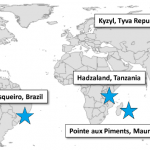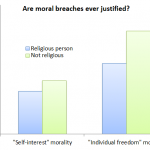There’s good evidence that one reason atheists are disliked is because they are distrusted, and that untrustworthy people are often assumed to be atheists. There’s also good evidence that the more atheists there are around, the more likely people are to trust them (and, incidentally, the more likely they are to feel comfortable with the idea of an atheist president.
So in a place like the UK, where approaching 50% of the population are non-believers, there should be no problem with atheists and trust, right?
Leah Giddings and Thomas Dunn, of Nottingham Trent University in the UK, set out to replicate some of the earlier work on atheism and trust, but with a twist.
They gave a group of 100 people a short story to read about Richard. It’s the same story that’s been used in previous research, and it goes as follows:
Richard is 31 years old. On his way to work one day, he accidentally backed his car into a parked van. Because pedestrians were watching, he got out of his car. He pretended to write down his insurance information. He then tucked the blank note into the van’s window before getting back into his car and driving away.
Later the same day, Richard found a wallet on the sidewalk. Nobody was looking, so he took all of the money out of the wallet. He then threw the wallet in a trash can.
Half the participants were asked whether they thought Richard was a teacher, or a teacher and a Christian. The other half were asked whether he was a teacher, or a teacher and an atheist.
Now of course there’s nothing in the story to indicate Richard’s spiritual beliefs, so if they claim it does that’s evidence of prejudice.
As expected, Christians were likely to be prejudiced against atheists. But once again, so were the atheists (albeit to a lesser degree – nearly 50% of atheists and over 75% of Christians associated atheism with untrustworthy behaviour).
So here we are in one of the most secular countries on earth, and even atheists think that other atheists aren’t to be trusted.
To follow on from this, the researchers gave the participants some statistics on the number of atheists in the country. Some of them got accurate statistics, and some got statistics that inflated the number of atheists.
It didn’t make much difference. Pro-christian prejudice went down, but anti-atheist prejudice did not.
______________
What these two studies show is that it can’t simply be fear of mortality that makes people dislike atheists. Because atheists, after all, don’t find comfort in religion when confronted by their own mortality. The real issues are deeper, and more pervasive. They’re strong in the USA, but present even in the highly secular UK.
People, it seems, really don’t trust atheists. And that’s got to give you pause for thought.
![]() Galen, L., Williams, T., & Ver Wey, A. (2014). Personality Ratings Are Influenced by Religious Stereotype and Ingroup Bias The International Journal for the Psychology of Religion, 24 (4), 282-297 DOI: 10.1080/10508619.2013.837658
Galen, L., Williams, T., & Ver Wey, A. (2014). Personality Ratings Are Influenced by Religious Stereotype and Ingroup Bias The International Journal for the Psychology of Religion, 24 (4), 282-297 DOI: 10.1080/10508619.2013.837658
Giddings, L., & Dunn, T. (2015). The robustness of anti-atheist prejudice as measured by way of cognitive errors The International Journal for the Psychology of Religion, 1-32 DOI: 10.1080/10508619.2015.1006487















